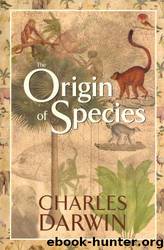The origin of species. Vol. 1. 2 by Charles Darwin

Author:Charles Darwin [Darwin, Charles]
Language: eng
Format: epub
Tags: Philosophy
Publisher: Appleton
Published: 1905-01-15T10:14:23.380000+00:00
Correlated Variation.
I mean by this expression that the whole organisation is so tied together during its growth and development, that when slight variations in any one part occur, and are accumulated through natural selection, other parts become modified. This is a very important subject, most imperfectly understood, and no doubt wholly different classes of facts may be here easily confounded together. We shall presently see that simple inheritance often gives the false appearance of correlation. One of the most obvious real cases is, that variations of structure arising in the young or larvæ naturally tend to affect the structure of the mature animal. The several parts of the body which are homologous, and which, at an early embryonic period, are identical in structure, and which are necessarily exposed to similar conditions, seem eminently liable to vary in a like manner: we see this in the right and left sides of the body varying in the same manner; in the front and hind legs, and even in the jaws and limbs, varying together, for the lower jaw is believed by some anatomists to be homologous with the limbs. These tendencies, I do not doubt, may be mastered more or less completely by natural selection; thus a family of stags once existed with an antler only on one side; and if this had been of any great use to the breed, it might probably have been rendered permanent by selection.
Homologous parts, as has been remarked by some authors, tend to cohere; this is often seen in monstrous plants: and nothing is more common than the union of homologous parts in normal structures, as in the union of the petals into a tube. Hard parts seem to affect the form of adjoining soft parts; it is believed by some authors that with birds the diversity in the shape of the pelvis causes the remarkable diversity in the shape of their kidneys. Others believe that the shape of the pelvis in the human mother influences by pressure the shape of the head of the child. In snakes, according to Schlegel, the form of the body and the manner of swallowing determine the position and form of several of the most important viscera.
The nature of the bond is frequently quite obscure. M. Is. Geoffroy St. Hilaire has forcibly remarked, that certain malconformations frequently, and that others rarely, co-exist, without our being able to assign any reason. What can be more singular than the relation in cats between complete whiteness and blue eyes with deafness, or between the tortoise-shell colour and the female sex; or in pigeons between their feathered feet and skin betwixt the outer toes, or between the presence of more or less down on the young pigeon when first hatched, with the future colour of its plumage; or, again, the relation between the hair and teeth in the naked Turkish dog, though here no doubt homology comes into play? With respect to this latter case of correlation, I think it can hardly be accidental, that the two orders of mammals which are most abnormal in their dermal covering, viz.
Download
This site does not store any files on its server. We only index and link to content provided by other sites. Please contact the content providers to delete copyright contents if any and email us, we'll remove relevant links or contents immediately.
| Diaries & Journals | Essays |
| Letters | Speeches |
The Rules Do Not Apply by Ariel Levy(4957)
Bluets by Maggie Nelson(4547)
Too Much and Not the Mood by Durga Chew-Bose(4337)
Pre-Suasion: A Revolutionary Way to Influence and Persuade by Robert Cialdini(4219)
The Motorcycle Diaries by Ernesto Che Guevara(4089)
Walking by Henry David Thoreau(3952)
Schaum's Quick Guide to Writing Great Short Stories by Margaret Lucke(3372)
What If This Were Enough? by Heather Havrilesky(3308)
The Daily Stoic by Holiday Ryan & Hanselman Stephen(3299)
The Day I Stopped Drinking Milk by Sudha Murty(3194)
The Social Psychology of Inequality by Unknown(3017)
Why I Write by George Orwell(2944)
Letters From a Stoic by Seneca(2790)
A Short History of Nearly Everything by Bryson Bill(2689)
A Burst of Light by Audre Lorde(2597)
Insomniac City by Bill Hayes(2545)
Feel Free by Zadie Smith(2476)
Upstream by Mary Oliver(2388)
Miami by Joan Didion(2364)
